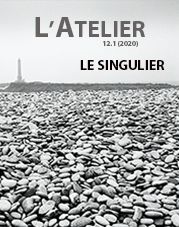Justice of the Singular : Socrates’ Apology and Deconstruction
A Reading of Plato's Apology
Abstract
The question of justice in Western philosophy finds its humble beginnings in the interplay of life and death. I am referring here to Plato’s Apology. The Apology is not only a text tracing the fate of the great philosopher Socrates by recounting his final speech before the judges of Athens, but it is also a text that, on a more subtle level, announces the advent of a promising justice that is birthed from death, or, to be more precise, from a specific kind of death. Socrates, here, develops a justice that does not surge from the defence of one’s determination as a singular accused, or from the reconciliation of the criminal singularity into the ethical social body through pardon or punishment, but which rather derives from a negation, a radical annihilation of the category of pure singularity. Socrates does not defend himself as an accused who is determinately and definitively singular, but rather affirms the fact that, in some sense, there is no such singular to be defended, that he is not even one (οὐδείς), less than one, nothing. It is, precisely, in this affirmation of a negative, in this opening of a chasm, that a radically other conception of justice and its relation to the singular is subtly proposed. By pushing the singular to the margins of its possibility, by challenging, bending, pushing the question of the singular and its defence to its outmost limit, Socrates redeploys justice not as a remedying balance, but as the abysmal economy of the bottomless question, a fall into the void, in which life, death, the singular and justice co-incide to burst all definitive determination, substantial opposition and the possibility of establishing a firm ground for any such categories to hold as such. In gradually shedding off the substantial presuppositions of his singularity (knowledge, self-relation and relation to others), he unleashes a modality of the singular which deploys a kind of justice, a wholly other justice, which has shaken the tradition ever since, and, as this article will seek to show, reverberates again in what Jacques Derrida called deconstruction.
Published
Issue
Section
License
- Work submitted for publication must be original, previously unpublished, and not under consideration for publication elsewhere. If previously published figures, tables, or parts of text are to be included, the copyright-holder's permission must have been obtained prior to submission.
- Authors of accepted manuscripts will assign to L'Atelier the right to electronically distribute their article, or publish it in any form (Internet, CD ROM, printed copy) but authors will retain copyright and, after the article has appeared in L'Atelier, authors may republish their text (in print and/or electronic form) as long as they clearly acknowledge L'Atelier as the original publisher.


